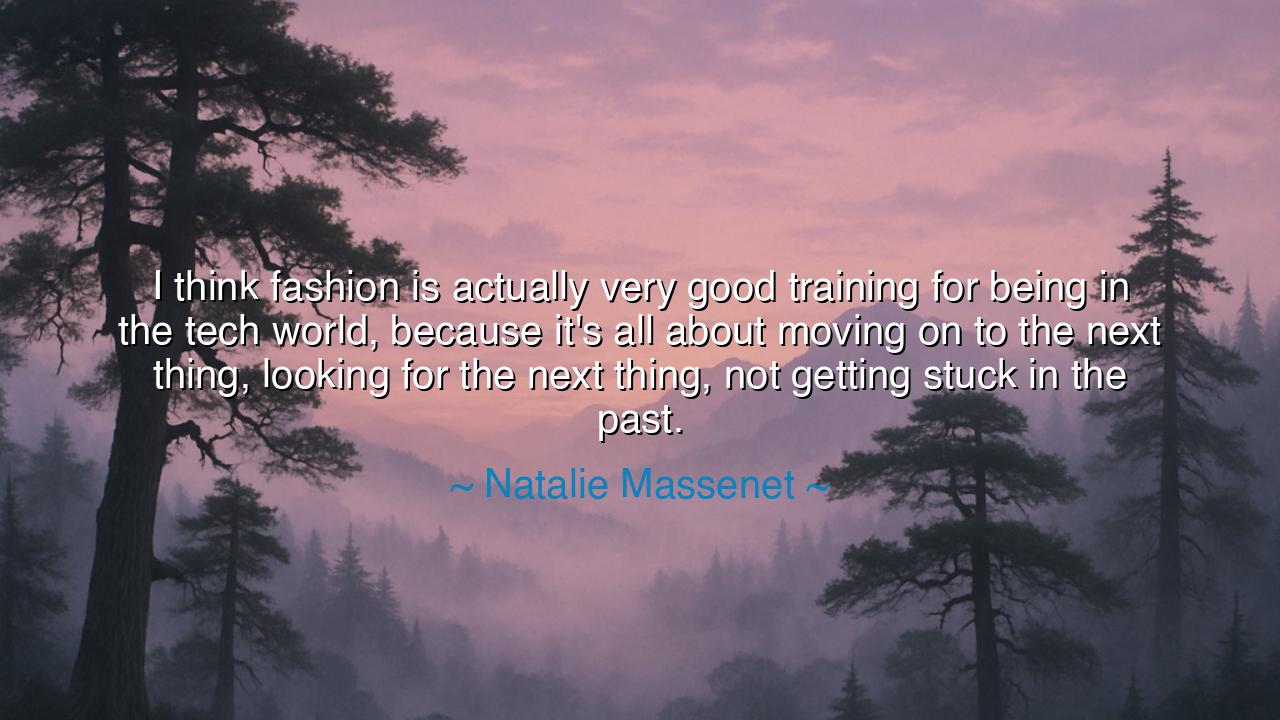
I think fashion is actually very good training for being in the
I think fashion is actually very good training for being in the tech world, because it's all about moving on to the next thing, looking for the next thing, not getting stuck in the past.






Hear the words of the visionary, Natalie Massenet, who proclaimed: “I think fashion is actually very good training for being in the tech world, because it's all about moving on to the next thing, looking for the next thing, not getting stuck in the past.” These words, though spoken in the modern halls of commerce and innovation, resound with ancient truth: that survival and greatness belong not to those who cling to yesterday, but to those who dare to embrace the constant birth of tomorrow.
The meaning is this: both fashion and technology are realms governed by change. In them, the present is fleeting, and what dazzles today becomes outdated tomorrow. To remain stagnant is to perish; to thrive is to move on to the next thing. Massenet’s wisdom is that one must cultivate the courage to let go, to seek ceaselessly, to remain in motion like the river that never pauses. For in stillness lies decay, but in movement lies creation.
The ancients understood this rhythm of renewal. Consider the cycle of Athens, whose greatness rested not only in philosophy and democracy, but in its willingness to reinvent itself through art, politics, and war. When Athens became rigid, unwilling to adapt, it fell into decline. So too in our age, fashion and technology demand the same ancient lesson: to endure, one must evolve, to evolve, one must embrace change. Not getting stuck in the past is not merely an industry principle—it is a law of survival.
History also offers the tale of Steve Jobs, who embodied Massenet’s truth. In the world of technology, he did not cling to past successes. When the iPod triumphed, he already looked toward the iPhone; when the iPhone soared, he envisioned the iPad. His power was not only invention, but the refusal to stand still. He understood, as fashion does, that greatness demands constant seeking of the next thing. To look backward too long is to lose sight of what lies ahead.
Yet Massenet’s words carry more than a lesson for industries—they speak to the human spirit itself. Many cling to their past glories, past wounds, past failures, and in doing so they chain themselves. But the wise know that life itself is like fashion and technology: it is ever-moving. The soul must learn to release yesterday and embrace tomorrow, not because yesterday lacked value, but because to live is to grow, and to grow is to change.
The lesson is luminous: train your spirit not to fear change, but to welcome it. See each ending not as death, but as the beginning of the next chapter. Do not mourn too long over what is past—whether a lost opportunity, a fading success, or an old wound. Instead, follow Massenet’s counsel: look for the next thing, for the world belongs to the seekers, the innovators, the souls that walk forward even when the road ahead is uncertain.
Practical actions must follow. In your work, do not rest too long on past victories—challenge yourself to create anew. In your personal life, do not allow past failures or pains to define you—seek healing and move forward. Practice renewal in daily habits: learn new skills, explore new ideas, surround yourself with those who inspire growth rather than nostalgia. In this way, you will cultivate a life that is ever-evolving, ever-creating, ever-moving.
For remember this eternal truth: life is not found in clinging, but in moving on. Just as fashion reinvents itself and technology races forward, so too must the human soul remain in motion. As Natalie Massenet teaches, the past has its place, but the future belongs to those who are willing to release it, to look forward, and to step boldly into what comes next.






AAdministratorAdministrator
Welcome, honored guests. Please leave a comment, we will respond soon